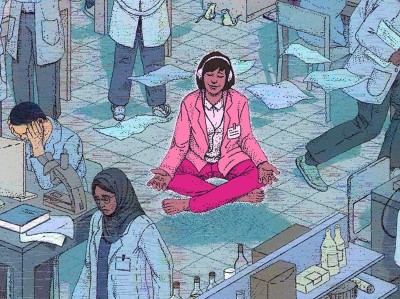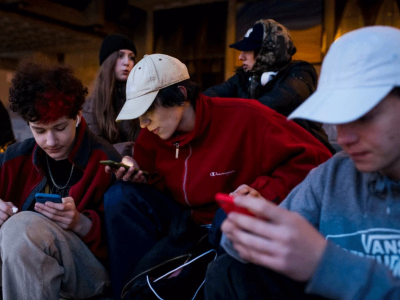A mental-health crisis plagues PhDs — these evidence-led initiatives offer help


Researchers have found that sharing experiences of mental-health struggles reduces stigma.Credit: Tempura/Getty
In 2019, at a conference in Germany, Wendy Ingram spoke about a grass-roots project aimed at raising awareness of mental-health issues among US researchers. Talking to other attendees, she realized that the problems were “systemic in academia: in every field, in every country”.
Studies of researchers globally suggest there is a mental-health crisis in academia. Depression and anxiety are particularly acute for early-career researchers, who uproot their lives every few years, have few long-term job prospects, and must cope with the relentless pressures of science’s ‘publish or perish’ culture.
Do smartphones and social media really harm teens’ mental health?
Driven by a lack of support at their institutions, graduate students and postdocs have begun building their own movements to find solutions. Now, many research centres offer evidence-based mental-health services to assist researchers, often through workshops and providing access to clinical support. Importantly, say researchers, initiatives are beginning to challenge the fundamental structures that reinforce what many call the toxic culture of research.
“Not only are there evidence-based tactics that work, but they are being deployed, and everyone can take advantage of them,” says Ingram, the founder and chief executive of Dragonfly Mental Health, a global non-profit advocacy group based in Bradenton, Florida.
“Culture change is the big challenge, and the question is how we move away from the narrative of surviving in academia to one of thriving. The only way it will happen is from the collective actions of many,” says Karin Jensen, a researcher in engineering education who conducts research to support faculty members’ mental health and well-being at the University of Michigan in Ann Arbor.
Connecting efforts
At the 2019 conference, Ingram realized that grass-roots initiatives trying to help were disconnected. “Engineers and cell biologists were trying to muddle their way through the psychology research. They were constantly reinventing the wheel,” she says.
The huge toll of PhDs on mental health: data reveal stark effects
So Ingram co-founded Dragonfly to join “wisdom from all the grass-roots things going on in siloed institutes” into formalized structures.
The organization has grown into a coalition of more than 450 volunteer academics worldwide who offer workshops, training schemes and campaigns to raise awareness of mental-health provisions in academia. It has delivered more than 375 programmes to some 60,000 academics in 32 countries — “with 96% of participants recommending our programmes to colleagues”, says Ingram.
The efforts focus on five areas: reducing stigma, improving mental-health literacy, improving supportive skills, encouraging peer-support networks, and creating structures across the research enterprise to take responsibility for mental health.
In addition to working with individual research centres such as the University of California (UC), Berkeley, Dragonfly has delivered workshops to fellows of science-funding agencies such as the Alfred P. Sloan Foundation in New York City and the Pew Charitable Trusts in Philadelphia, Pennsylvania.
Grounded in research
Dragonfly’s programmes are evidence-led, says Ingram. “We have studies; nothing hand-wavy or surface level. We provide actions that can and should be taken.” And where evidence is lacking, the organization collaborates on research to investigate solutions. Ingram co-published a 2024 study1 that found viewing a short film about mental-health challenges in academia reduced stigma around the topic for 92% of the 149 academics who participated.

How PhD students and other academics are fighting the mental-health crisis in science
The film shows senior faculty members talking about their experiences of mental-health conditions or neurodiversity. Kevin Mark, who watched the film during his postdoc at UC Berkeley, says it was the first time he’d seen senior researchers disclose their personal struggles.
Source link





